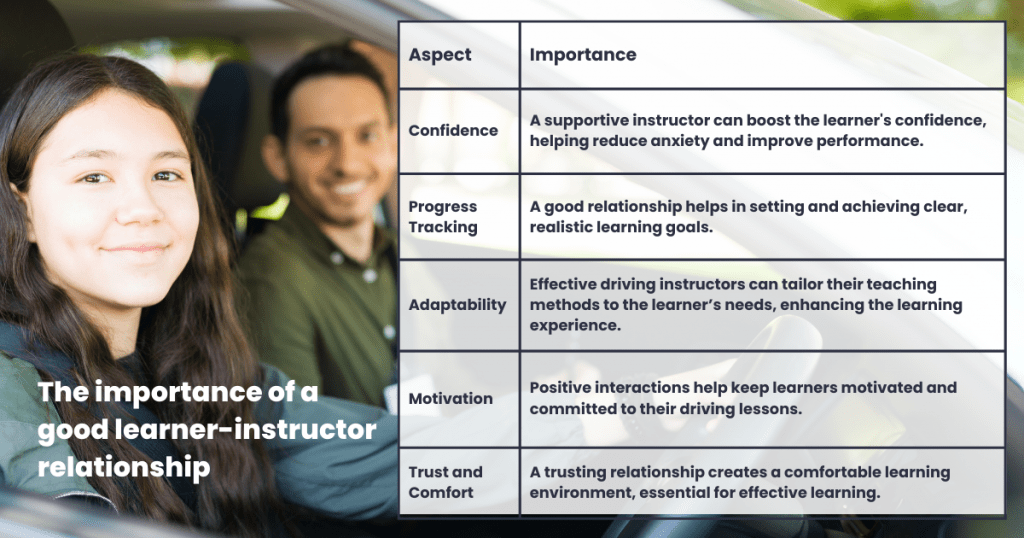Last Updated on April 3, 2025
Learning to drive is a significant milestone for many young people in the UK, representing a step towards greater independence and freedom. However, the journey from learner to licensed driver is often fraught with challenges, some of which can stem from the relationship between the learner driver and their driving instructor. Understanding these issues can help both learners and instructors create a more positive and effective learning experience.
The Importance of a Good Learner-Instructor Relationship

Background of Learning to Drive
In the UK, individuals can start learning to drive at 17, and many opt to take professional driving lessons to prepare for their practical driving test. Approved Driving Instructors (ADIs) play a crucial role in this process, providing the necessary guidance, instruction, and support. However, the dynamic between a learner driver and their instructor can sometimes be complex, and sometimes, avoidable problems and other issues with driving instructors can crop up that may hinder the learning experience which can lead to learners complaining about their driving instructors.

Common Issues with Driving Instructors and How to Address Them
Communication Barriers
- Issue: Effective communication is essential for successful driving lessons. However, some learners find it difficult to understand their instructor’s explanations or feel that their instructor is ignoring their concerns.
- Solution: Clear, open communication is key. Instructors should ensure they explain concepts in a way that is easy to understand and regularly check in with their students to address any confusion. Learners should feel comfortable asking questions and expressing their needs.
Teaching Style
- Issue: Not all learners respond well to the same teaching methods. Some may find their instructor’s style too strict or too laid-back, which can impact their confidence and progress.
- Solution: Instructors should be adaptable, adjusting their teaching style to suit the individual needs of each learner. They can ask for feedback and be willing to make changes to ensure the learner feels comfortable and supported.
Punctuality and Professionalism
- Issue: Consistency is important in learning to drive. If an instructor is frequently late or cancels lessons at short notice, it can disrupt the learner’s progress and cause frustration.
- Solution: Instructors should strive to be punctual and professional, providing adequate notice if they need to reschedule. This reliability helps build trust and shows respect for the learner’s time.
Progress Tracking
- Issue: Learners can become demotivated if they feel they are not making progress or if they do not understand what is required to improve.
- Solution: Instructors should provide regular feedback and set clear goals for each lesson. Using a progress tracker can help learners see how far they have come and what they need to focus on next.
Personality Clashes
- Issue: Sometimes, the personalities of the learner and the instructor simply do not mesh well, leading to a tense and uncomfortable learning environment.
- Solution: If a personality clash is affecting the learning experience, it may be best to find a different instructor. Both learners and instructors should not take this personally; it is about finding the right fit to ensure the best possible outcome.
Cost and Payment Issues
- Issue: Financial misunderstandings can create tension. Issues can arise over payment schedules, lesson costs, and cancellation policies.
- Solution: Clear, upfront communication about costs and payment policies is essential. Instructors should provide written agreements to avoid any misunderstandings, and learners should ensure they understand all terms before committing. There have been discussions in the learner driver industry to regular the costs of learning to drive.
Vehicle Condition and Safety
- Issue: The car used for driving lessons should be well-maintained and safe. Issues with the vehicle can cause stress and detract from the learning experience.
- Solution: Instructors should regularly check and maintain their vehicles, ensuring they are clean and safe to drive. Learners should not hesitate to speak up if they have concerns about the vehicle’s condition.
Anxiety and Stress Management
- Issue: Many learner drivers experience anxiety and stress, which can be exacerbated if they do not feel supported by their instructor.
- Solution: Instructors should be patient and understanding, providing reassurance and strategies to help manage anxiety. Creating a calm and positive learning environment can make a significant difference whilst avoiding other issues with driving instructors.

Tips for Learners
- Research and Choose Wisely: Take the time to research and choose an instructor who is well-reviewed and comes recommended. Meet with potential instructors to ensure a good fit.
- Set Expectations: Clearly communicate your goals, learning style, and any concerns at the beginning. This helps set the stage for a positive learning experience.
- Stay Committed: Regular practice and lessons are key to making steady progress. Consistency helps build confidence and skill.
- Seek Feedback: Ask for feedback on your progress and areas for improvement. Use this information to focus your practice and address weaknesses.
Tips for Instructors
- Be Adaptable: Tailor your teaching style to meet the needs of each learner. Flexibility can significantly enhance the learning experience.
- Maintain Professionalism: Always be punctual, prepared, and respectful. Your professionalism sets the tone for the lessons.
- Foster Communication: Encourage open communication and be receptive to feedback. Address any concerns promptly and constructively.
- Prioritise Safety: Ensure your vehicle is always in top condition and that safety is a primary focus during all lessons.
- Supportive Environment: Create a positive, supportive atmosphere to help learners feel comfortable and confident behind the wheel.
Conclusion
Building a successful learner-instructor relationship is essential for a positive driving learning experience. By understanding and addressing common issues with driving instructors and learners, both parties can work together to ensure a smooth and effective journey towards becoming a skilled, confident driver.
FAQs
If you don’t feel comfortable with your instructor, it is okay to find someone else. A good fit is crucial for effective learning.
Be open about your concerns and ask questions if you do not understand something. Good instructors will appreciate your efforts to communicate.
Look for someone who is patient, professional, and has complimentary reviews. It is also helpful if they can adapt their teaching style to your learning needs.
There is no set requirement for how many hours are needed before a driving test as every learner driver is different and may learn at a different pace. The average amount of hours is 40-45 hours however some learners will pass their test after 20-30 hours or even less.
Talk to your instructor about your anxiety. They can provide strategies to help manage your stress and create a supportive learning environment.









